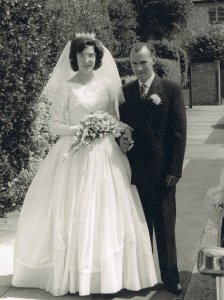George Bearman in 1961, with my mother (she is wearing a wedding dress made by my grandmother from found materials).
Lt William Marjot, 1944.
This 70th anniversary of V.E. Day I’m remembering members of my family who lived through the Second World War. These are not attested facts – they are my recollection of stories I heard growing up, and I apologise in advance to other members of my family who may know different stories, or different versions. Each family has its own war stories, and these reflect only some aspects of the reality of world war.
William Marjot was my paternal grandfather. He actually served in both world wars, having joined the Royal Navy as a midshipman when WW1 broke out. He was on board a ship that was stationed off the Dardanelles during the Gallipoli action, and remembered the lower ranks in an uproar when the RN were not allowed to engage the Turkish guns as the Turks’ range was believed to be greater. He never forgave the British powers for the numbers of Anzacs lost while the ships stood by.
At the outbreak of WW2 he was based at Devonport Naval Base in NZ where my Dad was born. His highest formal rank was Chief Petty Officer, but he was given a field commission to Lieutenant during the Baltic convoys. He was happy to accept the Looie’s pension when he retired, but was very proud of the fact he’d risen through the ranks.
He was a fearsome Chief Petty Officer and the ratings all went in awe of him – although he was only around 5’6’’ tall he apparently had a ‘presence’. I remember him as being a gentle, quietly spoken man, so it just goes to show that appearances can be deceiving! When I was a child he always refused to tell me his war stories. He believed that children, particularly girls, should be sheltered from knowing about such things. I often wonder what he saw during those times, what he experienced, but now I’ll never know. I still miss you, Grandpa Marjot.
The wartime experience of my Mum’s Dad, George Bearman, was quite different. He was deemed ‘unfit to serve’, probably due to poor physical condition – as was frequently the case with men who had grown up in the East End and had experienced poverty and malnutrition. George spent the war fighting fires and performing search and rescue operations during the blitz in London. Proof that military service was not the only way in which a man may serve his country.
By the time that I remember him, more than twenty years after the end of the war in Europe, he was a sick man, suffering from Parkinson’s Disease, and my grandmother had been the main breadwinner for many years. The wartime experiences of the women in my family were in many ways even more harrowing than those of the men, but I’m not ready to tell those stories yet. Just to remember two men who were beloved figures in my life, both of whom served their fellow men in conditions of great hardship and thoroughly deserve to be called war heroes.


Recent Comments